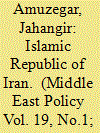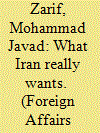| Srl | Item |
| 1 |
ID:
112954


|
|
|
|
|
| Publication |
2012.
|
| Summary/Abstract |
This article compares and contrasts democratic Islamization in Pakistan and Turkey, two countries where Islamic parties came to power through electoral means. Based on a comparative analysis of these experiences, this article will make the case that democratic Islamization can be best understood through a three-fold approach focusing on Islamization of educational systems, economies, and social policies. This analysis introduces two models of Islamic democracy: the "Conflicted Repressive Islamization" of Pakistan, and the "Subtle Islamization" of Turkey. It also suggests that the Turkish model will serve as the inspiration for future reformers in the Muslim world.
|
|
|
|
|
|
|
|
|
|
|
|
|
|
|
|
| 2 |
ID:
099184


|
|
|
| 3 |
ID:
084819


|
|
|
| 4 |
ID:
112112


|
|
|
| 5 |
ID:
020697


|
|
|
|
|
| Publication |
Winter 2001/02.
|
| Description |
59-68
|
|
|
|
|
|
|
|
|
|
|
|
|
|
|
|
| 6 |
ID:
130467


|
|
|
|
|
| Publication |
2014.
|
| Summary/Abstract |
Foreign policy is a critical component in the lives, conduct, and governance of all nation-states. But it has become even more significant in recent years as interstate relations have grown ever more complex. The inexorable rise in the number of international players -- including multilateral organizations, nonstate actors, and even individuals -- has further complicated policymaking. Meanwhile, the ongoing process of globalization -- however conceived and defined, whether lauded or despised -- has brought its inescapable weight to bear on the foreign policies of all states, whether large or small, developed or developing.
Since its establishment by a popular revolution in 1979, the Islamic Republic of Iran has grappled with these challenges. The postrevolutionary foreign policy of Iran has been based on a number of cherished ideals and objectives embedded in the country's constitution. These include the preservation of Iran's independence, territorial integrity, and national security and the achievement of long-term, sustainable national development. Beyond its borders, Iran seeks to enhance its regional and global stature; to promote its ideals, including Islamic democracy; to expand its bilateral and multilateral relations, particularly with neighboring Muslim-majority countries and nonaligned states; to reduce tensions and manage disagreements with other states; to foster peace and security at both the regional and the international levels through positive engagement; and to promote international understanding through dialogue and cultural interaction.
|
|
|
|
|
|
|
|
|
|
|
|
|
|
|
|